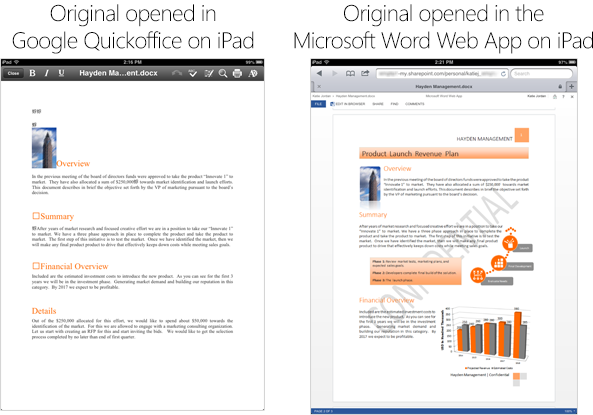After Bing and its Scroogled campaign, Microsoft is now taking aim at Google Docs. Jake Zborowski, Microsoft’s senior product manager for Office, actually published two anti-Docs blog posts today: one homes in on document fidelity, and the other, which includes a number of user testimonials, argues that Google Docs isn’t quite ready for primetime.
If it took me a little while to get Michael Atalla, the director of product marketing for Office 365, to actually say “Google” in my chat with him about Microsoft’s productivity tools earlier this week, Zborowski doesn’t beat around the bush for even a second. “Converting Office files into Google Apps is a gamble,” he writes. “Why take the gamble on converting your Office files to Google Docs when you can use Microsoft Office and the Microsoft Office Web Apps to create, share and edit your Office files with your content intact?”
That, Microsoft says, is true on the web, but also on the tablet, where Google’s Quickoffice usually does a pretty good job at converting documents (though not in Microsoft’s example, of course).
So what about the new Chrome document viewer? Also too much of a gamble for Zborowski: “The last gamble with Google is how the company helps you view Microsoft Office documents using their file viewers. Even this is a gamble that may be too risky to take.”
There is, of course, also a video that accompanies the post, which reminds folks that they could lose their promotion if they decide to switch to Docs:
In his second post (“Office is a team player”), Zborowski also argues that Google Docs is missing too many features, though in this case, a number of Microsoft customers make the argument for him. Here is an example:
As we continue to improve Office, we look for changes big and small that help people do more with less effort. Some improvements are small, like the new paste options we introduced in Office 2010. Other features reduce the amount of time it takes to accomplish a task like Flash Fill and Quick Analysis in Excel. The breadth of capabilities Office can lead to significant gains in what people can accomplish. With Google Docs, on the other hand, people have to find ways to overcome feature gaps by working harder, spending their time finding workarounds, or potentially using third-party tools to overcome the gaps.
“When we switched from Google Apps to Office 365, we freed our people to work together in synergy, and it has produced good results in every area of our business.” Read more
— Andy Springer, Director, Rookie Recruits
To back all of this up, Microsoft also launched whymicrosoft.com, which includes more testimonials, screenshots and other resources for those who haven’t been scared straight yet and are still considering the switch to Google Docs.
And here is the video that goes with that post:
All of this anti-Google Docs/Drive rhetoric just before Google I/O probably isn’t accidental. With Quickoffice, Google now has the basis to offer a pretty compelling alternative to the Microsoft Web Apps (which, and Microsoft has a point there, are generally more fully-featured than Google’s tools) and I would expect the company to launch more Quickoffice-based products next Wednesday.

